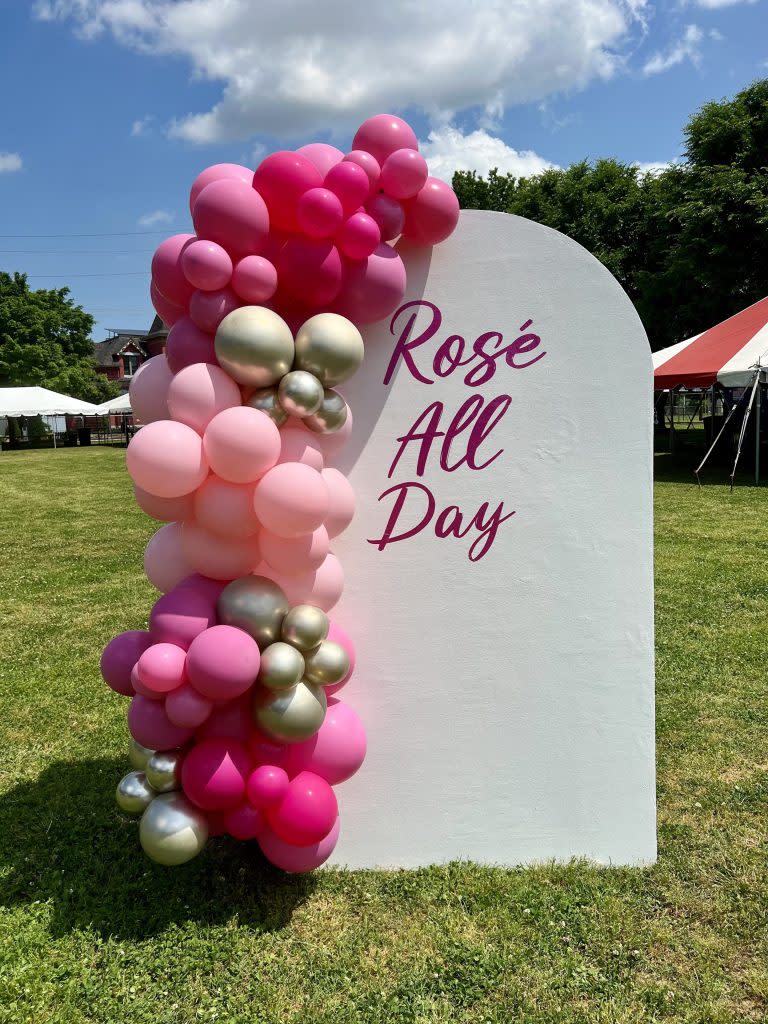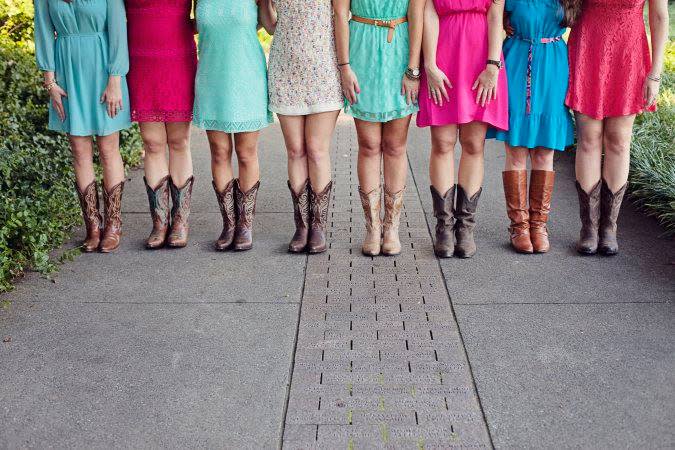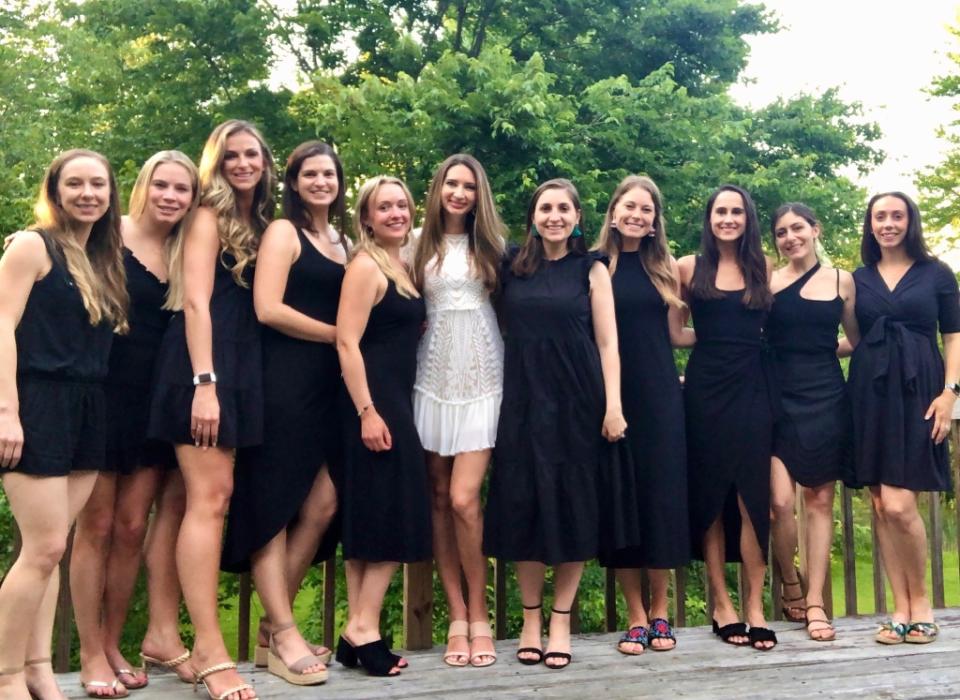$1,000 for the flight, $600 for the balloon arch: Coping with the ‘out-of-hand’ costs of bachelorette parties
Between airfare, her share of an Airbnb, the required matching outfits (blue bathing suits, no pattern), and food and drinks, Marie spent over $1,000 and used two of her 10 paid vacation days on a recent bachelorette weekend trip.
It's not the only such event she's attending this year. Later this summer, there's a second bachelorette weekend complete with a party bus, party boat, and group workout class. Though she won’t have to pay for airfare, Marie will still be spending around $600—plus however much five themed outfits will set her back. And she'll need to take another day of her precious PTO. The third bachelorette party the 29-year-old is invited to this year will cost around $500, she estimates. And then there are the three weddings.
All told, Marie, who asked to be identified by her middle name to protect her privacy, will spend over $3,000 this year alone on other people's wedding events and use over half of her paid vacation days. It’s all “truly getting out of hand,” she says.
“I am totally fine with bending over backwards and spending the time and money to attend someone's wedding,” says Marie. But “these bachelorette parties have gone from being a fun night out to an entire production so that the bride can get cute photos to post all over social media.”
Marie’s sentiment was echoed by other bridesmaids and partygoers, who say social media’s influence has turned bachelorette parties into outrageously expensive, weekend-long extravaganzas, often requiring attendees to pay for flights and accommodations in addition to bottomless drinks, lavish meals, and matching ensembles for the requisite photo ops.
The average bachelorette party cost between $317 and $1,900 in 2021, depending on how long it lasted, according to a survey from the Knot. About 20% of attendees are spending around $1,000 or more.
But with decades-high inflation and a post-COVID wedding explosion—plus a rush to "return to normal" after two years of rescheduled or pared-down parties—2022 is shaping up to be an even more expensive year for wedding attendees. In fact, 55% of wedding goers say they expect to spend more this year for wedding-related events as a result of the many that were postponed during the pandemic, a recent Credit Karma survey found.
All of the women interviewed for this article said they spent no less than $500 for a bachelorette party, and as much as $1,300 for a single weekend.
Sarah Patton, owner of Social Bliss Events in Nashville, Tenn., says over the 10 years she’s planned these pre-wedding festivities, the parties have gotten noticeably more expensive.
Though showing off on Instagram is oft cited as the reason people splurge on these events, Pinterest is just as much, if not more, to blame, Patton says: Brides or their party planners see “the biggest, the greatest, the latest” events online, and then want to re-create them before they know how much, say, a balloon arch photo backdrop or a private room at a restaurant actually costs (at least $600 and $2,500, respectively, according to Patton).

"That balloon backdrop is cute, but it comes with a hefty price tag," says Patton, who notes that as a single person she feels the sting more acutely than her dual-income-household friends when she attends the parties herself. "No one wants their bachelorette party to be the same, so you select new cities, even traveling abroad."
And with people in the U.S. getting married later in life on average, many brides feel the need to “go big” to make up for lost time, Patton says. Those more established in their careers tend to have more money to splurge on a weekend getaway than they would if they got married in their early 20s. Many brides now view their bachelorette as one last opportunity to have a girls’ trip with the friends they love the most. And if a friend attended your bachelorette party, it's expected that you'll reciprocate.
“There are good intentions. Maybe you haven't seen this group of friends since college, so making it a weekend, you get more than a dinner with someone,” says Patton. “We’re seeing the same trends with weddings. They used to be one day. Now there’s a Friday welcome party, a Saturday wedding, and a Sunday brunch.”
Partygoers are usually happy to spend the money on making the most of their friend’s once-in-a-lifetime event. Still, as fun as the weekend—or in some cases, weeklong—trips can be, the decorated hotel rooms, limousine rentals, cross-country flights, and themed brunches add up. That takes a toll on attendees, especially when they have multiple "once-in-a-lifetime" trips each year. Credit Karma's survey found 33% of Americans have attended a wedding or related event that they could not afford.
"The swag, the matching T-shirts, it's all gone so overboard," says Lisa Glover, 32, who estimates she has attended at least a dozen bachelorette parties since her early 20s, spending an average of $1,000 per party. "Does anybody need those T-shirts and sweatshirts that cost $30 and say 'Lisa’s bachelorette'? No."
Though she says she's more than willing to spend that money on her closest friends and those who attended her own bachelorette, Glover has turned down some trips because they didn't fit in her budget—particularly if travel was involved, and she wasn't close with the other attendees. While a weekend away with a close-knit group is worth the price of admission, a booze-soaked trip with people only the bride knows well doesn't hold the same appeal. Still, the expectation of attendance—and the cost—are the same.
"I’d rather spend my money going to the North Fork of Long Island with my husband than on a trip that’s going to be exhausting," says Glover.
'You do wonder how everyone is pulling that off'
More costly than simply attending, in some cases, is planning the event. Typically, the responsibility falls on the maid of honor or another bridesmaid, and being the one in charge often means a growing credit card balance that she hopes the other attendees will repay in a timely manner.
Tisha Ferraro, 26, knows the feeling all too well. Last year, she planned the bachelorette weekend for a close friend; she put everything for the trip—including the cost of a private chef, decorations, alcohol, other dinners, and matching pajamas—on her credit card and sent Venmo requests after the four-day trip to Lake Tahoe was over.
The California resident, having been to her fair share of pricey bachelorettes, held the party at her parent’s lake house to save money on accommodations. She also tried to be upfront with all of the attendees about the cost, which came out to about $550 per person. A self-described “Type A personality,” Ferraro made a spreadsheet to track everything she spent money on, and delineated a budget section in the group email so there wouldn't be any surprises for those invited.
“It was really stressful,” says Ferraro. “But for my girlfriends who do want a party, it’s a one-time thing, and as much as we roll our eyes at it and it’s costly, I think it’s important to celebrate and make them feel special.”

Etiquette for splitting expenses varies by group. Some prefer to have each attendee pay her share for everything from the beginning, and for everyone to keep track of their own costs throughout the trip. Others may go Ferraro's route—in which the organizer pays for everything and then splits expenses evenly after the trip has ended. Some groups also split the cost of the bride's trip, exacerbating costs for these vacations they have little say in planning.
Ferraro has six weddings on the docket this summer, which will be expensive in their own right with the travel, gifts, and other costs they entail. "It’s giving me heart palpitations," she says of the associated expenses. To pay for all of the related bachelorette parties, showers, and other wedding events, she jokes that she asked her parents to “start a bachelorette fund” for her birthday this year.
While she struggles to make the math work, she finds it surprising that it seems like everyone else, somehow, can afford these extravagant weekends—if her Instagram feed is any indication.
“What’s really strange is, we know most Americans are living paycheck to paycheck,” she says, noting that even people who don't have high-paying jobs are flying cross-country for these events. "You do wonder how everyone is pulling that off.”
'You can't simply say no'
So these weekend-long, destination parties are expensive. Why not just opt out?
Though she is more comfortable declining invites at this point in her life than she used to be, Glover says it’s not always easy to “just say no” to the bachelorette invite, particularly if you’re a bridesmaid. There is the social pressure to make the weekend as easy as possible for the bride, and not raise too much of a fuss lest it ruins her big day.
With expectations and emotions running high, friendships can sour quickly. Invitees often want to go, and when they don't, they go along with the plan because they don't want to risk hurting the bride's feelings.

“There was a definitely a side group chat going on” for the most expensive trip she's been on, Glover says. “When we tried to suggest a different location, it was not received well.”
“I hate when people say, ‘Just don't go,’” adds Marie, who considers attending pre-wedding events part of the deal of being a bridesmaid. “Since over-the-top bachelorette parties have become normalized—and are now the new standard—I feel like it is an expectation that you will attend unless you had a prior commitment. You can't simply say no without a good excuse.”
The women interviewed for this article all stressed the importance of setting expectations ahead of time. The worst thing a bride or party planner can do is spring an unexpected expense on attendees when they've already paid hundreds—and potentially thousands—of dollars.
Glover is hopeful that now that she and most of her friends are in their 30s, any future parties will be more manageable financially—and emotionally.
"When you’re a 31-year-old bride, some of my friends were pregnant and having babies, and that changes the dynamic," Glover says of her own party, which took place at a cabin in the Hudson Valley and included 10 women and matching dresses. "Hopefully as you get older you get more flexible with who can come."
This story was originally featured on Fortune.com
